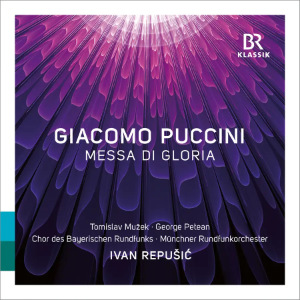
Giacomo Puccini (1858-1924)
Messa di Gloria (1878-80)
Preludio sinfonico (1882)
Crisantemi (arr. string orchestra Lucas Drew) (1890)
Tomislav Mužek (tenor); George Petean (baritone)
Chor des Bayerischen Rundfunk
Münchner Rundfunkorchester/Ivan Repušić
rec. live, 26-27 June 2024, Herz-Jesu-Kirche, Munich (Messa di Gloria); 2023, Studio 1, Bayerischer Rundfunk, Munich (Preludio sinfonico & Crisantemi)
Latin text of the mass with German & English translation
BR Klassik 900354 [60]
Puccini was barely twenty when he composed the Credo, which was later incorporated into this mass completed a couple of years later as his graduation exercise; the Preludio sinfonico was similarly a student work composed as his final exam in the Milan Conservatory. Crisantemi dates from somewhat later, and was, according to the composer, written in a single night as a response to the death of the Duke of Savoy. It was originally conceived for string quartet but is more usually played in arrangement for string orchestra, as per here. All three compositions here exhibit indications of both Puccini’s destiny as an operatic rather than a liturgical, church composer like his forebears and the influence of operatic giants such as Verdi, Massenet and Wagner. Furthermore, some obvious self-borrowings found their way into Edgar (1889) and Manon Lescaut (1893); in particular, Puccini redeployed two main themes from Crisantemi for Act IV of the latter.
Despite the lapse of time since, this disc is in direct competition with an EMI disc recorded in 2000 offering exactly the same programme – except it was entirely a studio recording – favourably reviewed first here and later here. Both reviewers praise the baritone, Thomas Hampson, the chorus and the conductor, Antonio Pappano, but criticise the tenor soloist, Roberto Alagna, for over-emoting in too operatic a manner. I agree with previous reviewers that it is regrettable that another student work, Capriccio sinfonico (1893), was not included here as an obvious companion piece on either disc, there being plenty of space available – but there it is.
Both recordings feature top conductors, orchestras and choruses. Repušić is marginally brisker in all three works. There is a great deal of the Intermezzo from Cavalleria rusticana in the Preludio sinfonico but of course Puccini’s composition precedes Mascagni’s by eight years; nonetheless, I feel that the score aspires to the same surging, yearning desperate beauty and Pappano has the edge here – although the studio sound given to Repušić by BR Klassik is crisper and fuller. The same is true of their respective accounts of Crisantemi; Pappano’s phrasing is more flexible and affectionate; his sound slightly less immediate.
Regarding the main work, this new recording of the mass is live, but there is absolutely no extraneous noise and I quite like the atmospheric “churchy” acoustic of the Herz-Jesu-Kirche. However, loud ensembles can become a tad mushy and wearing on the ear, whereas Pappano’s studio recording is obviously drier and more precise, which means more detail emerges. His touch is lighter and his rhythms more “sprung” but the climaxes still have the requisite impact. I do not share my colleagues’ aversion to Alagna’s manner in the Gloria; presumably his affect was approved and encouraged by Pappano, as they opted to embrace the overtly proleptic operatic character of the tenor’s passages. He certainly has a more glamorous timbre than the workaday – if perfectly acceptable – Tomislav Mužek. There is nothing to choose between the smooth baritones of Thomas Hampson and George Petean; both sing tastefully.
This is not Puccini’s major music, but it is pleasing and enjoyable. I don’t think collectors will necessarily want both recordings, however; choice will depend upon a judicious weighing up of the “swings and roundabouts” factors I iterate above.
(BR Klassik persists in issuing its CDs in plastic cases inside superfluous cardboard sleeves – instant recycling material.)
Ralph Moore
Previous review: Michael Cookson (October 2024)
Buying this recording via a link below generates revenue for MWI and helps us keep free access to the site



















